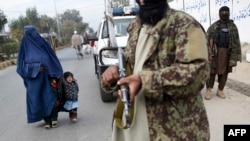After nearly two years of standoff diplomacy with de facto Taliban authorities, Washington is reviewing its Afghan policy in response to what U.S. officials call “draconian” Taliban governance.
The review comes as the United Nations is reportedly mulling a suspension of operations inside Afghanistan because the Taliban have banned Afghan women from work at U.N. agencies.
“The U.S. government has been reviewing our approach and engagement with the Taliban in the context of their increasingly draconian edicts targeting and discriminating against women and girls in Afghanistan,” a spokesperson for the Department of State told VOA.
Unmoved by global condemnation of their misogynistic policies, including from Muslim-majority countries, the Taliban insist that depriving women of education, work and political participation is an internal Afghan issue.
Washington’s tougher tone comes as the U.N. Secretary-General Antonio Guterres is reportedly planning to convene an international gathering in May to discuss the possibility of giving the Taliban a seat at the U.N. General Assembly in exchange for reversing the Islamist regime’s cascade of restrictions on Afghan women.
When asked about the proposed meeting’s goals on Wednesday, Russia’s Ambassador to the United Nations Vassily Nebenzia told reporters in New York that he does not believe the group will consider recognition.
“I understand the Secretary-General, as he shared it with some of the member states, me included, will be looking for the opinion of those special envoys on how they see the way out for Afghanistan.”
Despite maintaining firm control over the entire country for nearly two years, the Taliban have failed to gain recognition from any government while the Afghanistan seat at the U.N. is still occupied by Naseer Ahmad Faiq, an appointee of the former Afghan government.
Meeting the opposition
Amid growing U.S. frustration with the Taliban, American diplomats have reached out to some former Afghan politicians and warlords who have set up political bases outside Afghanistan.
This week, U.S. Special Representative for Afghanistan Tom West met with several Afghans in Istanbul saying he heard “deep concerns” about the Taliban rule in Afghanistan.
The National Resistance Council for the Salvation of Afghanistan, an anti-Taliban group, said its representatives met West on Monday at his request. The group said in a tweet that it gave West a roadmap for “saving the country from the ongoing crisis.”
No U.S. official has traveled to Afghanistan since the Taliban seized power in 2021, but Washington has bypassed the Taliban and maintained robust diplomatic and humanitarian engagement with Afghans.
Still, some think the U.S. should do more to engage. “Why is every other envoy traveling to or staying in [Afghanistan] but him,” tweeted Obaidullah Baheer, an Afghan analyst, about West’s meetings in Turkey. “I fail to see the logic behind meeting exiled and failed Republic warlords and politicians.”
While not extending a formal recognition, most regional countries, including Russia, China, Iran and Pakistan, have kept their embassies open in Kabul and have accredited Taliban representatives in their capitals.
Shinkai Karokhail, a former Afghan ambassador to Canada and a women’s rights activist, said even if U.S. diplomats were to travel to Afghanistan, they would not have access to unfiltered realities.
“The Taliban will not allow meetings with the representatives of the people or women’s groups and other civil and political activists,” she told VOA.
The U.S.’s continued engagement with former Afghan officials, often blamed for massive corruption and cataclysmic failures, is also seen by some as unhelpful.
“When there is a vacuum of representation or leadership, what is achieved by filling that vacuum by platforming victors of tragic failures?” said an Afghan activist who asked not to be named.
Intervention?
Under the Doha agreement signed between U.S. and Taliban officials in February 2020, the U.S. committed not to intervene in Afghanistan’s domestic affairs.
U.S. officials say they are not backing military uprisings against Taliban rule but demand they form an inclusive government.
Last month, an audio of part of a speech to a group of Afghan women by Karen Decker, the Qatar-based charge d’affaires of the U.S. mission to Afghanistan, was circulating on WhatsApp.
“We are trying to figure out how to get the best parts of the previous government and create and figure out how we can help Afghans create a new government for their country,” Decker is heard saying.
A spokesperson for the Department of State said Decker’s comments were consistent with a long-standing position by the international community.
“We have been clear in calling on the Taliban to form an inclusive and representative government that can legitimately speak for all Afghans.”
U.S. officials say the formation of an inclusive government should be exclusively an issue for Afghans to handle, not imposed by the international community.
“If the Taliban hope for a government that enjoys international legitimacy, launching a political dialogue among Afghans is a first step. Legitimacy begins at home,” the spokesperson said.
Such calls have thus far found no listeners among Taliban leaders.
“It is not clear yet whether the Taliban leadership in Kandahar has a roadmap for a political process that would strengthen legitimacy at home and abroad,” Omar Samad, a former Afghan ambassador to France, told VOA.
While the Taliban remain internationally isolated, Samad said “conditions, circumstances, threat perceptions, balance of power and the regional and international order are very different” now compared to the 1990s.
The Taliban made a commitment in the Doha agreement to forbid international terror groups in areas under their control, a change from their position that allowed al Qaida to operate freely. And unlike the 1990s when the Taliban were battling warlords for control of the country, since the 2021 U.S. withdrawal the Taliban has been Afghanistan’s ruling power with no real challengers.
“The question now is whether there is political will in both capitals for reframing and relaunching new talks on the way forward,” Samad said.
Margaret Besheer contributed to this article from New York.





